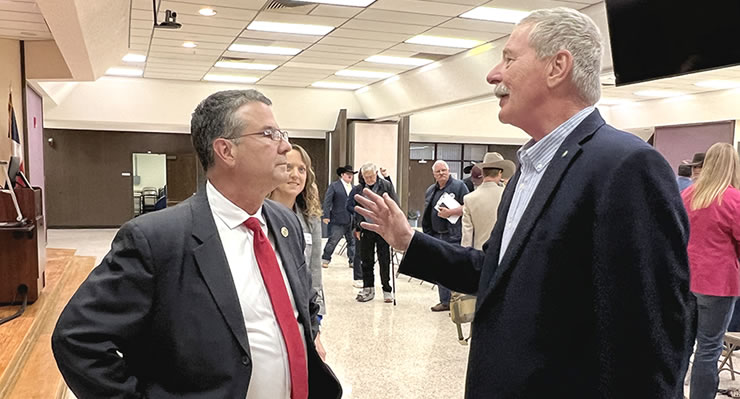
State Sen. Charles Perry (R-Lubbock) met with students and constituents at the Clarendon College Bairfield Activity Center last Wednesday, October 19, to cover a variety of issues that will be coming up during before the state legislature in 2023.
Perry said the state’s economy is being fueled right now but said he expects it to slow down, and the senator outlined some of his top priorities in the next legislative session, including spending $9 billion to fix the state’s electric grid and focusing on the recapturing water used in oil production and treating it.
“Water will determine if Texas is here for your great-grandchildren,” Perry said.
With that in mind, Perry also supports a $2 billion water initiative designed to help improve water infrastructure in the state, noting that about 143 billion gallons leaks out of water lines currently.
The senator intends to carry a bill intended to improve discipline in schools by removing difficult students from the classroom. Perry also said the state is cannot stop the next school shooting, but there will be efforts to improve school safety, which will come with oversight.
Perry hedged on a question about whether he would support a ballot initiative on Texas withdrawing from the Union, noting that it’s a complex issue and that while Texas could probable survive on its own, he prefers to see Texas thrive.
Asked about his view of local government, Perry said that when local governments raise taxes, it’s the state that takes the blame for it. Perry said places like Houston “bring their trash to the legislature,” and lawmakers try to deal with those communities’ issues, particularly rising taxes. Perry, however, has supported “carve outs” that are designed to shield small rural counties from rules aimed at large, urban counties.
Asked about increasing the base allotment for public schools and about the teacher shortage, Perry said the legislature will focus more on “paying down property taxes” than increasing the allotment and said the teacher shortage “is temporary” and that discipline was more important than pay in terms of teachers staying in the profession.


Reader Comments